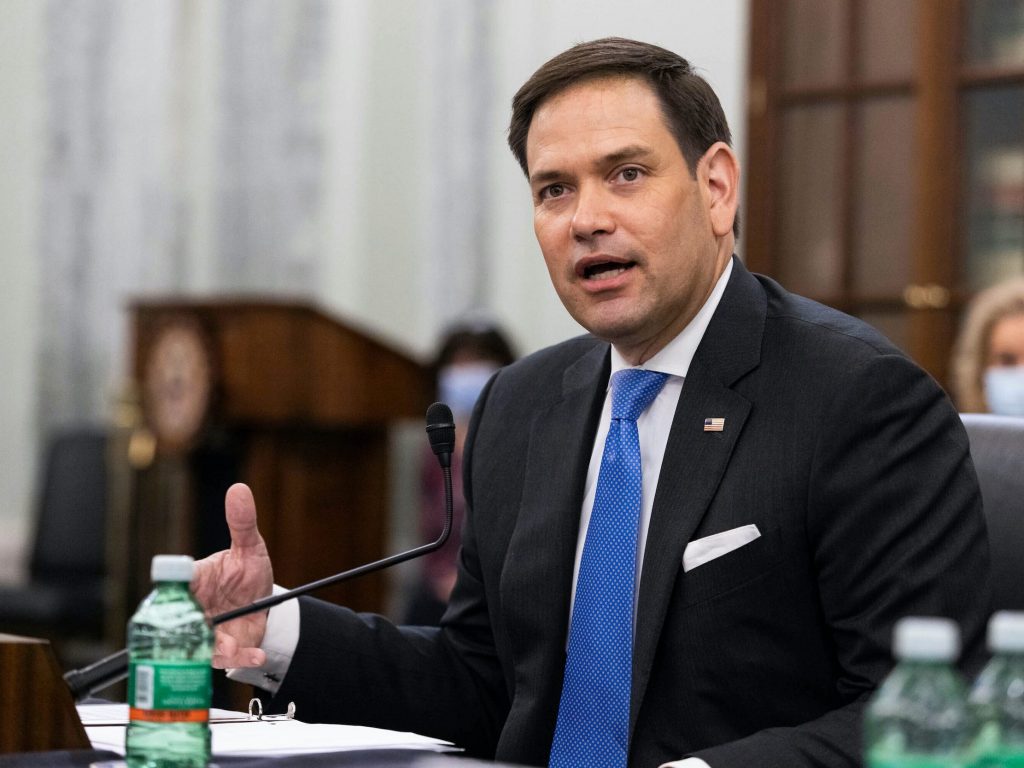- Marco Rubio has never shied away from calling himself "pro-life."
- But as he seeks reelection he hasn't said which abortion ban a GOP-majority Senate should pursue.
- Republicans have new openings on abortion restrictions now that Roe v. Wade is history.
Like many Senate Republicans, Sen. Marco Rubio of Florida says he's "pro-life" but has avoided calling for a national abortion ban in the wake of the Supreme Court's opinion overturning Roe v. Wade.
Rubio, who is up for reelection in November, instead has championed his forthcoming bill that he says is "truly pro-life" because it would expand federal support during pregnancy and parenthood.
But in a 2010 questionnaire, then-first-time US Senate candidate Rubio was far more explicit about the types of abortion restrictions he'd support.
He backed a constitutional amendment to ban abortions unless a pregnancy is life-threatening, and said he'd support a bill to give spouses the right to be notified and intervene before an abortion.
The questionnaire, from the National Pro-Life Alliance, asked whether Rubio would support 10 of their priorities. He replied "yes" to all of them.
The questionnaire sheds some light into how Rubio views abortion, though his Senate record and public comments add more to the story.
With the midterms less than five months away, Democrats are pressuring Senate Republicans to explain where precisely they stand on abortion. They hope the contrast on the issue will help them make inroads in places like Florida as they seek to expand their razor-thin majority.
Now that the Supreme Court has overturned Roe, the 1973 decision that guaranteed a national right to abortion, the legality of abortion falls to state legislatures unless Congress overrides them with a national abortion guarantee or ban. Many Senate Republicans have avoided saying which ban, if any, they'll support.
Twelve years after Rubio filled out the National Pro-Life Alliance questionnaire, he has followed through on some pledges.
He cosponsored legislation to permanently prevent federal funds from paying for most abortions. Another bill he cosponsored would obligate doctors to give abortion pills to patients only in person, and not via telehealth video meetings or through the mail.
Rubio hasn't made any comments that show he would no longer support the measures in the questionnaire, but also hasn't followed through on all the pledges from the form.
For instance, while he agreed to support the Life at Conception Act, Rubio hasn't cosponsored the bill. ButRubio, who is Catholic, has said he believes life begins at conception.
Rubio also has cosponsored bills not on the questionnaire. They included a bill that would ban abortion nationally after 20 weeks, and levy criminal penalties on doctors who don't comply, as well as legislation that would obligate doctors to get consent from parents for minors who travel across state lines for abortions.
GOP senators haven't announced a national anti-abortion plan
Rubio agreed with overturning Roe and has consistently opposed abortion. But he sidestepped a question from Insider in May asking which national abortion laws a Republican-controlled Senate should support.
Speaking on Fox News' Sean Hannity Friday, Rubio stressed that now state legislatures could decide "whether they want to allow abortion, prohibit it, and how they want to regulate it." In Florida, a law is expected to take effect July 1 that will make abortions illegal after 15 weeks, with no exceptions for rape, incest, or human trafficking.
It's not clear yet whether a Senate Republican majority would seek an all-out ban or a more incremental approach on abortion. The conservative House Republican Study Committee has endorsed a six-week ban while other House Republicans are eyeing a national 15-week ban, CNN reported.
Senate Minority Leader Mitch McConnell said in May that a national abortion ban was "possible" but pledged he wouldn't do it through abolishing the filibuster, meaning lowering the voting threshold to pass major legislation to 51 votes. Still, coalescing behind legislation would tee up a bill for a future GOP president.
The National Pro-Life Alliance didn't answer questions from Insider about which abortion restrictions it wanted candidates to support after Roe.

Democrats lean in on abortion rights
In contrast to Republicans, most congressional Democrats unified behind the Women's Health Protection Act, which would make abortion legal in all states and undo most restrictions.
Rubio opposed the bill in May, calling it "radical and outrageous" because it allows for undefined "health" exemptions to abortions late in a pregnancy.
Rep. Val Demings of Florida, the frontrunner to be Rubio's Democratic opponent in November, voted for the bill. She also voted for a spending bill that eliminated the Hyde Amendment, a rider that blocks the federal government from paying for most abortions.
Demings called for eliminating the filibuster in a USA Today column last year. When she was asked about the Supreme Court in a 2020 PBS interview she said it was"incumbent upon us to use every tool within our authority to right a wrong."
But Demings didn't sign onto a House bill last year to increase the number of Supreme Court justices from nine to 12. On Tuesday, her campaign told Insider she doesn't support a court expansion.
Demings also told reporters last month that she supports abortion until viability and afterward only "when it threatens the health of the woman, the mother."
The Demings campaign is also going on offense on abortion. A new website accuses Rubio of having a "Radical Agenda for Women" and posted his National Pro-Life Alliance questionnaire.
Her campaign has accused Rubio of opposing legal abortion even in cases of rape or incest. Asked about this in a 2015 CNN interview, Rubio said he personally believed "you do not correct one tragedy with a second tragedy."
It's not yet clear whether abortion rights will be the lighting-rod issue that Democrats hope will help them keep or gain seats in November. They still have to contend with Biden's sagging approval ratings, and voters are struggling with high costs of everyday needs, from food to gas.
Rubio focused on a "pro-family" approach
Most Republicans did unite on an abortion bills under then-President Donald Trump, voting on a bill that dealt with botched, late-pregnancy abortions and another that would have nationally banned abortions after 20 weeks.
The bills failed but Rubio voted for both while Demings voted against both. It's possible Republicans could resurface these bills or go further under pressure from anti-abortion advocates.
Last week, Rubio introduced a framework for his forthcoming legislation, the Providing for Life Act. The document includes bills he has introduced before and doesn't address nationalizing abortion restrictions.
Among other provisions, the bill would increase the child tax credit he pushed to double in 2017 and extend it to cover the time during pregnancy.
It also would make the adoption tax credit fully refundable, require biological fathers to pay at least half of pregnancy-related medical costs, and takes from legislation he introduced in 2018 that would allow new parents to withdraw early from their Social Security in order to help fund paid leave.
"Our work is far from over," Rubio wrote in the Washington Examiner on the Roe decision. "We can and must do more for unborn children and their mothers. What we need is a pro-life plan for post-Roe America."

